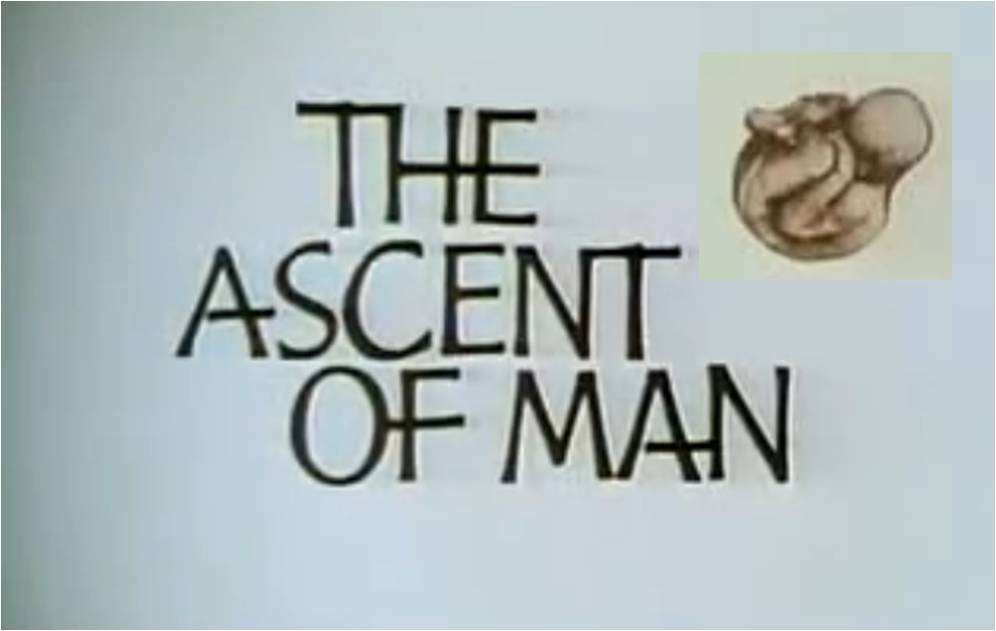The Ascent of Man
The Ascent of Man is a 1973 BBC documentary series written and presented by Jacob Bronowski, looking at human history through scientific and technological achievements from prehistoric era to the mid-20th century. The title alludes to The Descent of Man, the second book on evolution by Charles Darwin. Over the series' thirteen episodes, Bronowski travelled around the world in order to trace the development of human society through its understanding of science. It was commissioned specifically to complement Kenneth Clark's Civilisation (1969), in which Clark argued that art reflected and was informed by the major driving forces in cultural evolution.
 |
Episode 01 - Lower Than the Angels
This episode tells of human evolution from 4 million years ago to 400,000 years ago, using computer graphics.
Episode 02 - The Harvest of the Seasons
This episode explains early human migration, agriculture, the introduction of tools, and the domestication of animals.
Episode 03 - The Grain in the Stone
This episode looks at the development of architecture and sculpture, visiting Arizona's Canyon de Chelly, Peru's Machu Picchu, etc.
Episode 04 - The Hidden Structure
This episode traces the development of chemistry from the early use of fire to disclose metals like copper to our modern knowledge of the elements.
Episode 05 - Music of the Spheres
This episode looks at the evolution of mathematics, tracing the impact of Pythagorean thought on the Islamic empire, Moorish Spain and Renaissance Europe.
Episode 06 - The Starry Messenger
This episode looks at astronomy, tracing the origins of the scientific revolution in the conflict between truth and religious dogma, symbolized by the trial of Galileo.
Episode 07 - The Majestic Clockwork
This episode tells of the evolution of physics, looking at the revolution that occurred when Einstein's theory of relativity upset Newton's elegant description of the universe.
Episode 08 - The Drive for Power
This episode looks at the industrial and political revolutions of the 18th century, which were as significant as the Renaissance in man's progress.
Episode 09 - The Ladder of Creation
Jacob Bronowski focuses on the theory of evolution by natural selection, which he describes as "the most important single scientific innovation in the 19th century."
Episode 10 - World within World
This episode looks at the world inside the atom, tracing the history of the men and ideas that have made modern physics.
Episode 11 - Knowledge or Certainty
Jacob Bronowski talks about physics and and the clash of the pursuit of absolute vs. imperfect knowledge, and the misgivings of the scientists realizing the terrible outcome of the conflict.
Episode 12 - Generation upon Generation
This episode examines the complex code of human inheritance from the experiments of Gregor Mendel to the discoveries of today.
Episode 13 - The Long Childhood
This episode is a summing up of the various strands of thought that have been developed during the series, investigating man's growing self-knowledge.
| Related Links |
| The Ascent of Man - wikipedia The Ascent of Man is a thirteen-part documentary television series produced by the BBC and Time-Life Films first transmitted in 1973, written and presented by Jacob Bronowski. |
| Origins: The Journey of Humankind This is an eight-part documentary series hosted by Jason Silva, tracing the pivotal innovations that make us modern. |
| Mankind: The Story of All of Us This is a twelve-part documentary series telling the history of the human race from the beginning of humanity to the rise of modern society as we know it through some of critical events in human history. |
| James Burke's Connections This is a ten-part documentary series presented by science historian James Burke, exploring the various paths of how our modern technological world came into existence. |
| The Story of Science This is a BBC science documentary series presented by Michael Mosley, exploring how the evolution of scientific understanding is intimately interwoven with society's historical path. |